Python入妖4-----Request库的基本使用
什么是Requests
Requests是用python语言基于urllib编写的,采用的是Apache2 Licensed开源协议的HTTP库
如果你看过上篇文章关于urllib库的使用,你会发现,其实urllib还是非常不方便的,而Requests它会比urllib更加方便,可以节约我们大量的工作。(用了requests之后,你基本都不愿意用urllib了)一句话,requests是python实现的最简单易用的HTTP库,建议爬虫使用requests库。
默认安装好python之后,是没有安装requests模块的,需要单独通过pip安装
requests功能详解
总体功能的一个演示
import requests
response = requests.get("https://www.baidu.com")
print(type(response))
print(response.status_code)
print(type(response.text))
print(response.text)
print(response.cookies)
print(response.content)
print(response.content.decode("utf-8"))
我们可以看出response使用起来确实非常方便,这里有个问题需要注意一下:
很多情况下的网站如果直接response.text会出现乱码的问题,所以这个使用response.content
这样返回的数据格式其实是二进制格式,然后通过decode()转换为utf-8,这样就解决了通过response.text直接返回显示乱码的问题.
请求发出后,Requests 会基于 HTTP 头部对响应的编码作出有根据的推测。当你访问 response.text 之时,Requests 会使用其推测的文本编码。你可以找出 Requests 使用了什么编码,并且能够使用 response.encoding 属性来改变它.如:
response =requests.get("http://www.baidu.com")
response.encoding="utf-8"
print(response.text)
各种请求方式
requests里提供个各种请求方式
import requests
requests.post("http://httpbin.org/post")
requests.put("http://httpbin.org/put")
requests.delete("http://httpbin.org/delete")
requests.head("http://httpbin.org/get")
requests.options("http://httpbin.org/get")
请求
基本GET请求
import requests
response = requests.get('http://httpbin.org/get')
print(response.text)
带参数的GET请求,例子1
import requests
response = requests.get("http://httpbin.org/get?name=zhaofan&age=23")
print(response.text)
如果我们想要在URL查询字符串传递数据,通常我们会通过httpbin.org/get?key=val方式传递。Requests模块允许使用params关键字传递参数,以一个字典来传递这些参数,例子如下:
import requests
data = {
"name":"zhaofan",
"age":22
}
response = requests.get("http://httpbin.org/get",params=data)
print(response.url)
print(response.text
上述两种的结果是相同的,通过params参数传递一个字典内容,从而直接构造url
注意:第二种方式通过字典的方式的时候,如果字典中的参数为None则不会添加到url上
解析json
import requests
import json response = requests.get("http://httpbin.org/get")
print(type(response.text))
print(response.json())
print(json.loads(response.text))
print(type(response.json()))
从结果可以看出requests里面集成的json其实就是执行了json.loads()方法,两者的结果是一样的
获取二进制数据
在上面提到了response.content,这样获取的数据是二进制数据,同样的这个方法也可以用于下载图片以及
视频资源
添加headers
和前面我们将urllib模块的时候一样,我们同样可以定制headers的信息,如当我们直接通过requests请求知乎网站的时候,默认是无法访问的
import requests
response =requests.get("https://www.zhihu.com")
print(response.text)
这样会得到如下的错误
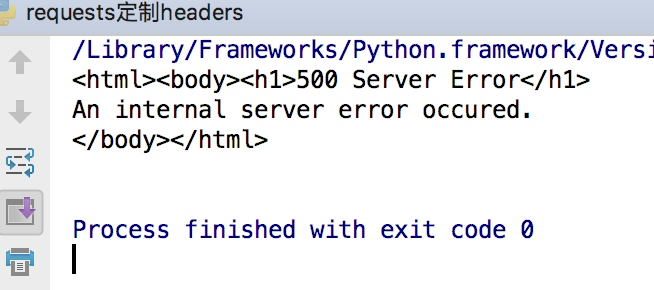
因为访问知乎需要头部信息,这个时候我们在谷歌浏览器里输入chrome://version,就可以看到用户代理,将用户代理添加到头部信息
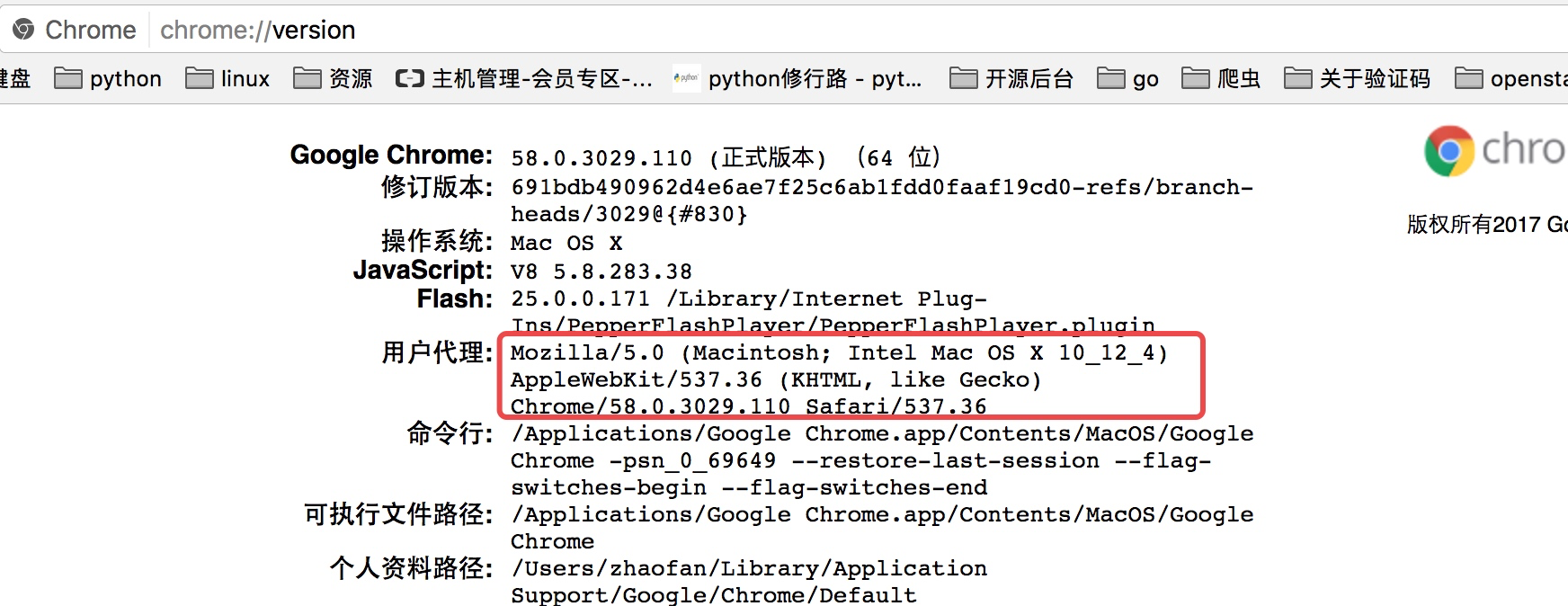
import requests
headers = { "User-Agent":"Mozilla/5.0 (Macintosh; Intel Mac OS X 10_12_4) AppleWebKit/537.36 (KHTML, like Gecko) Chrome/58.0.3029.110 Safari/537.36"
}
response =requests.get("https://www.zhihu.com",headers=headers) print(response.text)
这样就可以正常的访问知乎了。
基本POST请求
通过在发送post请求时添加一个data参数,这个data参数可以通过字典构造成,这样
对于发送post请求就非常方便
import requests
data = {
"name":"zhaofan",
"age":23
}
response = requests.post("http://httpbin.org/post",data=data)
print(response.text)
同样的在发送post请求的时候也可以和发送get请求一样通过headers参数传递一个字典类型的数据
响应
我们可以通过response获得很多属性,例子如下
import requests
response = requests.get("http://www.baidu.com")
print(type(response.status_code),response.status_code)
print(type(response.headers),response.headers)
print(type(response.cookies),response.cookies)
print(type(response.url),response.url)
print(type(response.history),response.history)
结果如下:

状态码判断
Requests还附带了一个内置的状态码查询对象
主要有如下内容:
100: ('continue',),
101: ('switching_protocols',),
102: ('processing',),
103: ('checkpoint',),
122: ('uri_too_long', 'request_uri_too_long'),
200: ('ok', 'okay', 'all_ok', 'all_okay', 'all_good', '\o/', '✓'),
201: ('created',),
202: ('accepted',),
203: ('non_authoritative_info', 'non_authoritative_information'),
204: ('no_content',),
205: ('reset_content', 'reset'),
206: ('partial_content', 'partial'),
207: ('multi_status', 'multiple_status', 'multi_stati', 'multiple_stati'),
208: ('already_reported',),
226: ('im_used',),
Redirection.
300: ('multiple_choices',),
301: ('moved_permanently', 'moved', '\o-'),
302: ('found',),
303: ('see_other', 'other'),
304: ('not_modified',),
305: ('use_proxy',),
306: ('switch_proxy',),
307: ('temporary_redirect', 'temporary_moved', 'temporary'),
308: ('permanent_redirect',
'resume_incomplete', 'resume',), # These 2 to be removed in 3.0
Client Error.
400: ('bad_request', 'bad'),
401: ('unauthorized',),
402: ('payment_required', 'payment'),
403: ('forbidden',),
404: ('not_found', '-o-'),
405: ('method_not_allowed', 'not_allowed'),
406: ('not_acceptable',),
407: ('proxy_authentication_required', 'proxy_auth', 'proxy_authentication'),
408: ('request_timeout', 'timeout'),
409: ('conflict',),
410: ('gone',),
411: ('length_required',),
412: ('precondition_failed', 'precondition'),
413: ('request_entity_too_large',),
414: ('request_uri_too_large',),
415: ('unsupported_media_type', 'unsupported_media', 'media_type'),
416: ('requested_range_not_satisfiable', 'requested_range', 'range_not_satisfiable'),
417: ('expectation_failed',),
418: ('im_a_teapot', 'teapot', 'i_am_a_teapot'),
421: ('misdirected_request',),
422: ('unprocessable_entity', 'unprocessable'),
423: ('locked',),
424: ('failed_dependency', 'dependency'),
425: ('unordered_collection', 'unordered'),
426: ('upgrade_required', 'upgrade'),
428: ('precondition_required', 'precondition'),
429: ('too_many_requests', 'too_many'),
431: ('header_fields_too_large', 'fields_too_large'),
444: ('no_response', 'none'),
449: ('retry_with', 'retry'),
450: ('blocked_by_windows_parental_controls', 'parental_controls'),
451: ('unavailable_for_legal_reasons', 'legal_reasons'),
499: ('client_closed_request',),
Server Error.
500: ('internal_server_error', 'server_error', '/o\', '✗'),
501: ('not_implemented',),
502: ('bad_gateway',),
503: ('service_unavailable', 'unavailable'),
504: ('gateway_timeout',),
505: ('http_version_not_supported', 'http_version'),
506: ('variant_also_negotiates',),
507: ('insufficient_storage',),
509: ('bandwidth_limit_exceeded', 'bandwidth'),
510: ('not_extended',),
511: ('network_authentication_required', 'network_auth', 'network_authentication'),
通过下面例子测试:(不过通常还是通过状态码判断更方便)
import requests
response= requests.get("http://www.baidu.com")
if response.status_code == requests.codes.ok:
print("访问成功")
项目实例:
使用流程
- 指定url
- 基于requests模块发起请求
- 获取响应对象中的数据值
- 持久化存储
1、需求:爬取搜狗指定词条搜索后的页面数据
import requests
import os
#指定搜索关键字
word = input('enter a word you want to search:')
#自定义请求头信息
headers={
'User-Agent': 'Mozilla/5.0 (Macintosh; Intel Mac OS X 10_12_0) AppleWebKit/537.36 (KHTML, like Gecko) Chrome/69.0.3497.100 Safari/537.36',
}
#指定url
url = 'https://www.sogou.com/web'
#封装get请求参数
param = {
'query':word,
'ie':'utf-8'
}
#发起请求
response = requests.get(url=url,params=param) #获取响应数据
page_text = response.text with open('./sougou.html','w',encoding='utf-8') as fp:
fp.write(page_text)
2、需求:登录豆瓣电影,爬取登录成功后的页面数据
import requests
import os
url = 'https://accounts.douban.com/login'
#封装请求参数
data = {
"source": "movie",
"redir": "https://movie.douban.com/",
"form_email": "",
"form_password": "bobo@15027900535",
"login": "登录",
}
#自定义请求头信息
headers={
'User-Agent': 'Mozilla/5.0 (Macintosh; Intel Mac OS X 10_12_0) AppleWebKit/537.36 (KHTML, like Gecko) Chrome/69.0.3497.100 Safari/537.36',
}
response = requests.post(url=url,data=data)
page_text = response.text with open('./douban111.html','w',encoding='utf-8') as fp:
fp.write(page_text)
3、需求:爬取豆瓣电影分类排行榜 https://movie.douban.com/中的电影详情数据
#!/usr/bin/env python
# -*- coding:utf-8 -*- import requests
import urllib.request
if __name__ == "__main__": #指定ajax-get请求的url(通过抓包进行获取)
url = 'https://movie.douban.com/j/chart/top_list?' #定制请求头信息,相关的头信息必须封装在字典结构中
headers = {
#定制请求头中的User-Agent参数,当然也可以定制请求头中其他的参数
'User-Agent': 'Mozilla/5.0 (Windows NT 6.1; Win64; x64) AppleWebKit/537.36 (KHTML, like Gecko) Chrome/66.0.3359.181 Safari/537.36',
} #定制get请求携带的参数(从抓包工具中获取)
param = {
'type':'',
'interval_id':'100:90',
'action':'',
'start':'',
'limit':''
}
#发起get请求,获取响应对象
response = requests.get(url=url,headers=headers,params=param) #获取响应内容:响应内容为json串
print(response.text)
4、需求:爬取肯德基餐厅查询http://www.kfc.com.cn/kfccda/index.aspx中指定地点的餐厅数据
#!/usr/bin/env python
# -*- coding:utf-8 -*- import requests
import urllib.request
if __name__ == "__main__": #指定ajax-post请求的url(通过抓包进行获取)
url = 'http://www.kfc.com.cn/kfccda/ashx/GetStoreList.ashx?op=keyword' #定制请求头信息,相关的头信息必须封装在字典结构中
headers = {
#定制请求头中的User-Agent参数,当然也可以定制请求头中其他的参数
'User-Agent': 'Mozilla/5.0 (Windows NT 6.1; Win64; x64) AppleWebKit/537.36 (KHTML, like Gecko) Chrome/66.0.3359.181 Safari/537.36',
} #定制post请求携带的参数(从抓包工具中获取)
data = {
'cname':'',
'pid':'',
'keyword':'北京',
'pageIndex': '',
'pageSize': ''
}
#发起post请求,获取响应对象
response = requests.get(url=url,headers=headers,data=data) #获取响应内容:响应内容为json串
print(response.text)
5、需求:爬取搜狗知乎指定词条指定页码下的页面数据
import requests
import os
#指定搜索关键字
word = input('enter a word you want to search:')
#指定起始页码
start_page = int(input('enter start page num:'))
end_page = int(input('enter end page num:'))
#自定义请求头信息
headers={
'User-Agent': 'Mozilla/5.0 (Macintosh; Intel Mac OS X 10_12_0) AppleWebKit/537.36 (KHTML, like Gecko) Chrome/69.0.3497.100 Safari/537.36',
}
#指定url
url = 'https://zhihu.sogou.com/zhihu'
#创建文件夹
if not os.path.exists('./sougou'):
os.mkdir('./sougou')
for page in range(start_page,end_page+1):
#封装get请求参数
params = {
'query':word,
'ie':'utf-8',
'page':str(page)
}
#发起post请求,获取响应对象
response = requests.get(url=url,params=params)
#获取页面数据
page_text = response.text
fileName = word+'_'+str(page)+'.html'
filePath = './sougou/'+fileName
with open(filePath,'w',encoding='utf-8') as fp:
fp.write(page_text)
print('爬取'+str(page)+'页结束')
requests高级用法
文件上传
实现方法和其他参数类似,也是构造一个字典然后通过files参数传递
import requests
files= {"files":open("git.jpeg","rb")}
response = requests.post("http://httpbin.org/post",files=files)
print(response.text)
结果如下:
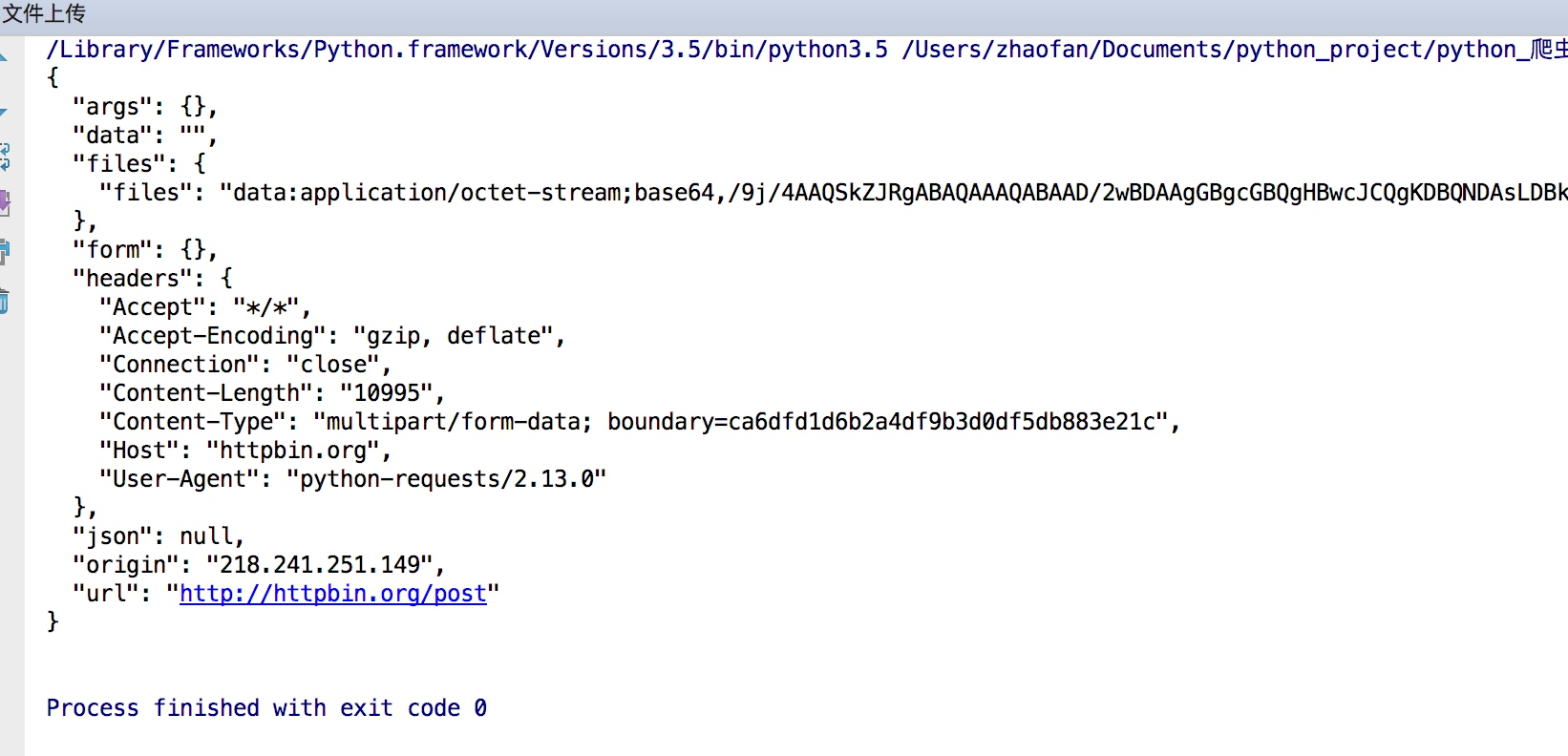
获取cookie
import requests
response = requests.get("http://www.baidu.com")
print(response.cookies)
for key,value in response.cookies.items():
print(key+"="+value)
会话维持
cookie的一个作用就是可以用于模拟登陆,做会话维持
import requests
s = requests.Session()
s.get("http://httpbin.org/cookies/set/nufffmber/123456")
response = s.get("http://httpbin.org/cookies")
print(response.text)
这是正确的写法,而下面的写法则是错误的
import requests
requests.get("http://httpbin.org/cookies/set/number/123456")
response = requests.get("http://httpbin.org/cookies")
print(response.text)
因为这种方式是两次requests请求之间是独立的,而第一次则是通过创建一个session对象,两次请求都通过这个对象访问
证书验证
现在的很多网站都是https的方式访问,所以这个时候就涉及到证书的问题
import requests
response = requests.get("https:/www.12306.cn")
print(response.status_code)
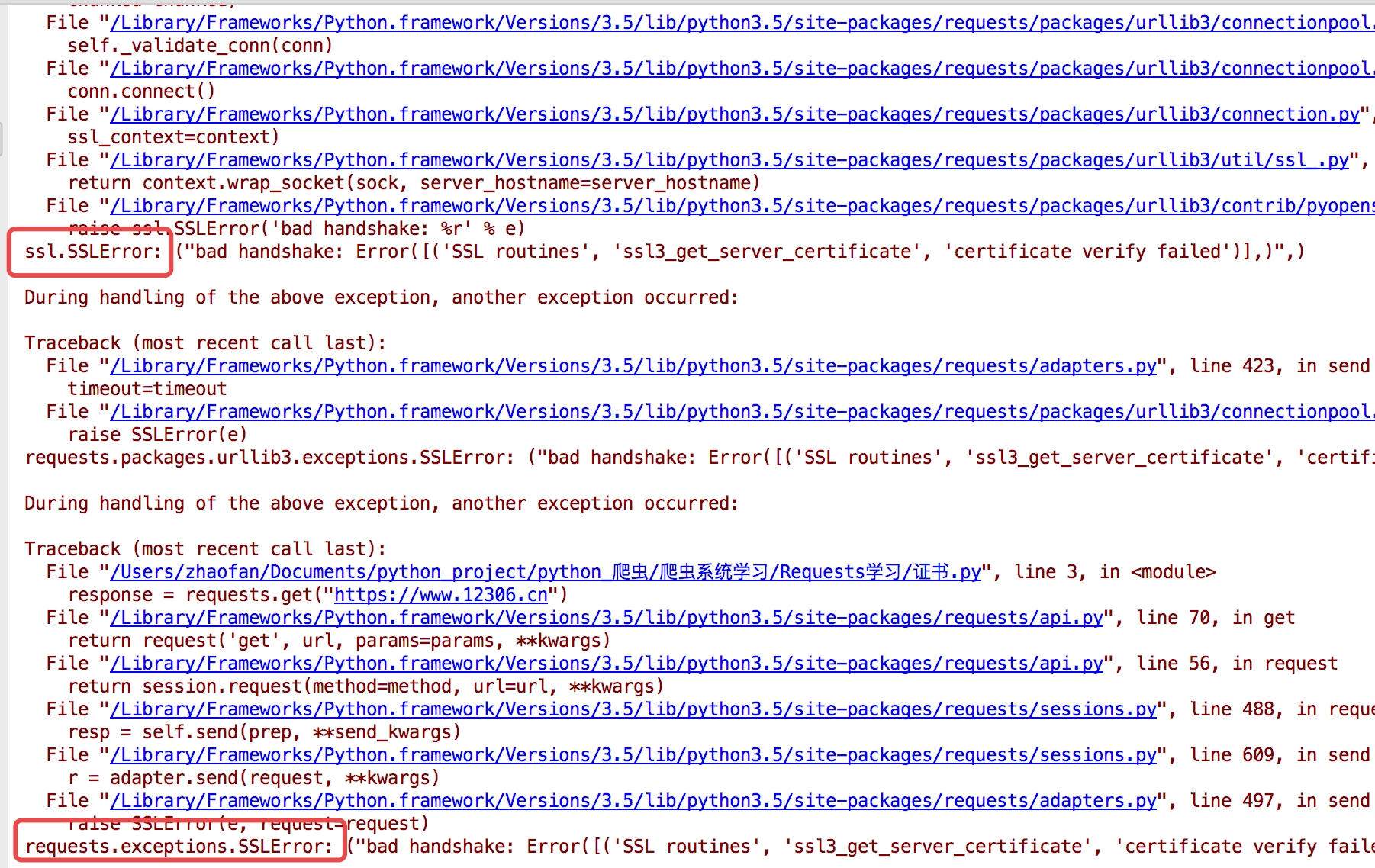
为了避免这种情况的发生可以通过 verify=False
但是这样是可以访问到页面,但是会提示:
InsecureRequestWarning: Unverified HTTPS request is being made. Adding certificate verification is strongly advised. See: https://urllib3.readthedocs.io/en/latest/advanced-usage.html#ssl-warnings InsecureRequestWarning)
解决方法为:
import requests
from requests.packages import urllib3 urllib3.disable_warnings()
response = requests.get("https://www.12306.cn",verify=False)
print(response.status_code)
这样就不会提示警告信息,当然也可以通过cert参数放入证书路径
代理设置
import requests
proxies= {
"http":"http://127.0.0.1:9999",
"https":"http://127.0.0.1:8888"
}
response = requests.get("https://www.baidu.com",proxies=proxies)
print(response.text)
如果代理需要设置账户名和密码,只需要将字典更改为如下:
proxies = {
"http":"http://user:password@127.0.0.1:9999"
}
如果你的代理是通过sokces这种方式则需要pip install "requests[socks]"
proxies= {
"http":"socks5://127.0.0.1:9999",
"https":"sockes5://127.0.0.1:8888"
}
超时设置
通过timeout参数可以设置超时的时间
认证设置
如果碰到需要认证的网站可以通过requests.auth模块实现
import requests
from requests.auth import HTTPBasicAuth
response = requests.get("http://120.27.34.24:9001/",auth=HTTPBasicAuth("user",""))
print(response.status_code)
当然这里还有一种方式
import requests
response = requests.get("http://120.27.34.24:9001/",auth=("user",""))
print(response.status_code)
异常处理
关于reqeusts的异常在这里可以看到详细内容:
http://www.python-requests.org/en/master/api/#exceptions
所有的异常都是在requests.excepitons中
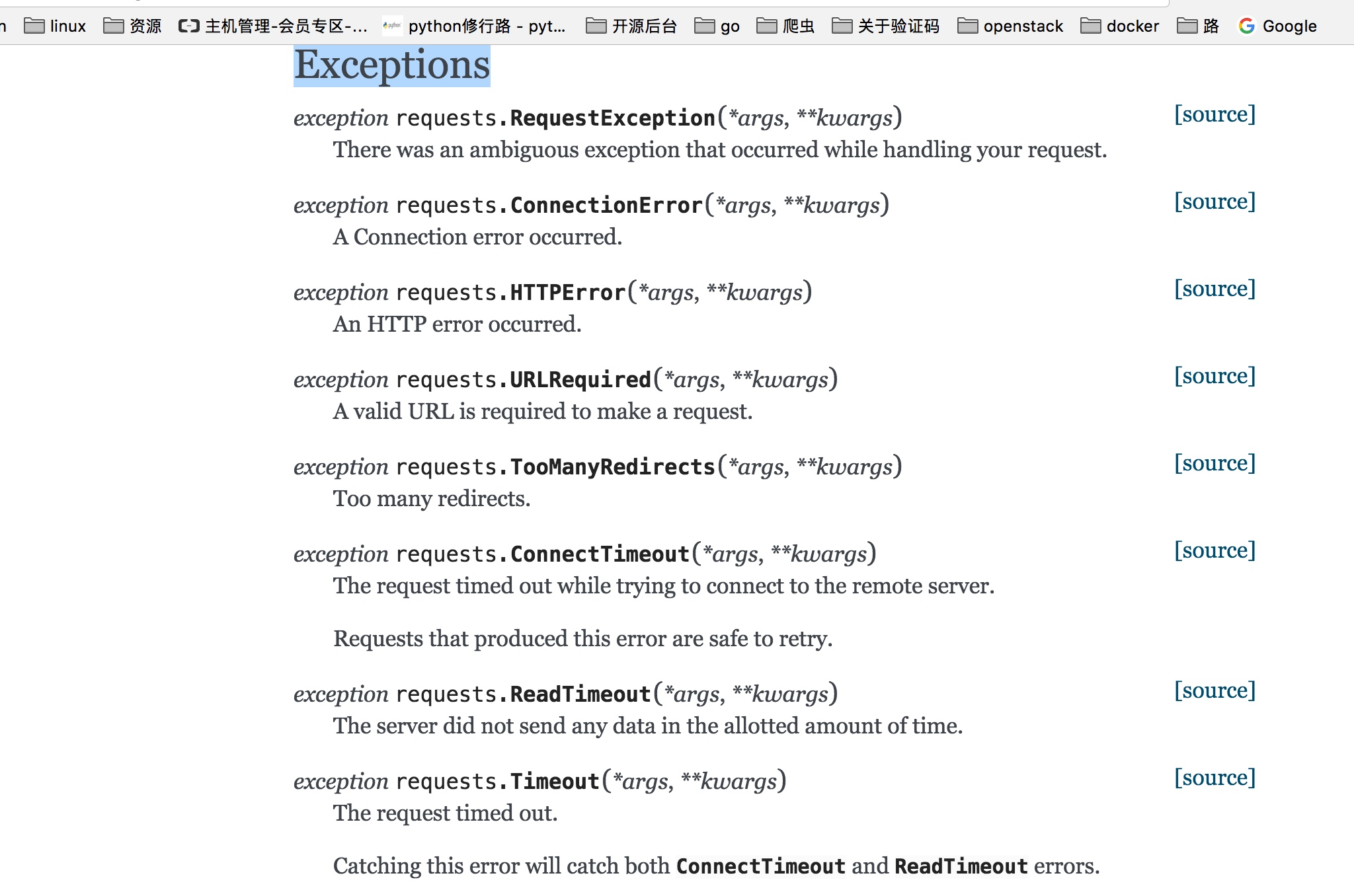
从源码我们可以看出RequestException继承IOError,
HTTPError,ConnectionError,Timeout继承RequestionException
ProxyError,SSLError继承ConnectionError
ReadTimeout继承Timeout异常
这里列举了一些常用的异常继承关系,详细的可以看:
http://cn.python-requests.org/zh_CN/latest/_modules/requests/exceptions.html#RequestException
通过下面的例子进行简单的演示
import requests
from requests.exceptions import ReadTimeout,ConnectionError,RequestException try:
response = requests.get("http://httpbin.org/get",timeout=0.1)
print(response.status_code)
except ReadTimeout:
print("timeout")
except ConnectionError:
print("connection Error")
except RequestException:
print("error")
其实最后测试可以发现,首先被捕捉的异常是timeout,当把网络断掉的haul就会捕捉到ConnectionError,如果前面异常都没有捕捉到,最后也可以通过RequestExctption捕捉到
项目实例:
cookie和代理实例
一、基于requests模块的cookie操作
引言:有些时候,我们在使用爬虫程序去爬取一些用户相关信息的数据(爬取张三“人人网”个人主页数据)时,如果使用之前requests模块常规操作时,往往达不到我们想要的目的,例如:
#!/usr/bin/env python
# -*- coding:utf-8 -*-
import requests
if __name__ == "__main__": #张三人人网个人信息页面的url
url = 'http://www.renren.com/289676607/profile' #伪装UA
headers={
'User-Agent': 'Mozilla/5.0 (Macintosh; Intel Mac OS X 10_12_0) AppleWebKit/537.36 (KHTML, like Gecko) Chrome/69.0.3497.100 Safari/537.36',
}
#发送请求,获取响应对象
response = requests.get(url=url,headers=headers)
#将响应内容写入文件
with open('./renren.html','w',encoding='utf-8') as fp:
fp.write(response.text)
结果发现,写入到文件中的数据,不是张三个人页面的数据,而是人人网登陆的首页面,why?首先我们来回顾下cookie的相关概念及作用:
cookie概念:当用户通过浏览器首次访问一个域名时,访问的 web服务器会给客户端发送数据,以保持web服务器与客户端之间的状态保持,这些数据就是cookie。
cookie作用:我们在浏览器中,经常涉及到数据的交换,比如你登录邮箱,登录一个页面。我们经常会在此时设置30天内记住我,或者自动登录选项。那么它们是怎么记录信息的呢,答案就是今天的主角cookie了,Cookie是由HTTP服务器设置的,保存在浏览器中,但HTTP协议是一种无状态协议,在数据交换完毕后,服务器端和客户端的链接就会关闭,每次交换数据都需要建立新的链接。就像我们去超市买东西,没有积分卡的情况下,我们买完东西之后,超市没有我们的任何消费信息,但我们办了积分卡之后,超市就有了我们的消费信息。cookie就像是积分卡,可以保存积分,商品就是我们的信息,超市的系统就像服务器后台,http协议就是交易的过程。
经过cookie的相关介绍,其实你已经知道了为什么上述案例中爬取到的不是张三个人信息页,而是登录页面。那应该如何抓取到张三的个人信息页呢?
思路:
1、我们需要使用爬虫程序对人人网的登录时的请求进行一次抓取,获取请求中的cookie数据。
2、在使用个人信息页的url进行请求时,该请求需要携带 1 中的cookie,只有携带了cookie后,服务器才可识别这次请求的用户信息,方可响应回指定的用户信息页数据。
#!/usr/bin/env python
# -*- coding:utf-8 -*-
import requests
if __name__ == "__main__": #登录请求的url(通过抓包工具获取)
post_url = 'http://www.renren.com/ajaxLogin/login?1=1&uniqueTimestamp=201873958471'
#创建一个session对象,该对象会自动将请求中的cookie进行存储和携带
session = requests.session()
#伪装UA
headers={
'User-Agent': 'Mozilla/5.0 (Macintosh; Intel Mac OS X 10_12_0) AppleWebKit/537.36 (KHTML, like Gecko) Chrome/69.0.3497.100 Safari/537.36',
}
formdata = {
'email': '',
'icode': '',
'origURL': 'http://www.renren.com/home',
'domain': 'renren.com',
'key_id': '',
'captcha_type': 'web_login',
'password': '7b456e6c3eb6615b2e122a2942ef3845da1f91e3de075179079a3b84952508e4',
'rkey': '44fd96c219c593f3c9612360c80310a3',
'f': 'https%3A%2F%2Fwww.baidu.com%2Flink%3Furl%3Dm7m_NSUp5Ri_ZrK5eNIpn_dMs48UAcvT-N_kmysWgYW%26wd%3D%26eqid%3Dba95daf5000065ce000000035b120219',
}
#使用session发送请求,目的是为了将session保存该次请求中的cookie
session.post(url=post_url,data=formdata,headers=headers) get_url = 'http://www.renren.com/960481378/profile'
#再次使用session进行请求的发送,该次请求中已经携带了cookie
response = session.get(url=get_url,headers=headers)
#设置响应内容的编码格式
response.encoding = 'utf-8'
#将响应内容写入文件
with open('./renren.html','w') as fp:
fp.write(response.text)
二、基于requests模块的代理操作
- 什么是代理
代理就是第三方代替本体处理相关事务。例如:生活中的代理:代购,中介,微商......
爬虫中为什么需要使用代理
一些网站会有相应的反爬虫措施,例如很多网站会检测某一段时间某个IP的访问次数,如果访问频率太快以至于看起来不像正常访客,它可能就会会禁止这个IP的访问。所以我们需要设置一些代理IP,每隔一段时间换一个代理IP,就算IP被禁止,依然可以换个IP继续爬取。
代理的分类:
正向代理:代理客户端获取数据。正向代理是为了保护客户端防止被追究责任。
反向代理:代理服务器提供数据。反向代理是为了保护服务器或负责负载均衡。
免费代理ip提供网站
http://www.goubanjia.com/
西祠代理
快代理
代码:
#!/usr/bin/env python
# -*- coding:utf-8 -*-
import requests
import random
if __name__ == "__main__":
#不同浏览器的UA
header_list = [
# 遨游
{"user-agent": "Mozilla/4.0 (compatible; MSIE 7.0; Windows NT 5.1; Maxthon 2.0)"},
# 火狐
{"user-agent": "Mozilla/5.0 (Windows NT 6.1; rv:2.0.1) Gecko/20100101 Firefox/4.0.1"},
# 谷歌
{
"user-agent": "Mozilla/5.0 (Macintosh; Intel Mac OS X 10_7_0) AppleWebKit/535.11 (KHTML, like Gecko) Chrome/17.0.963.56 Safari/535.11"}
]
#不同的代理IP
proxy_list = [
{"http": "112.115.57.20:3128"},
{'http': '121.41.171.223:3128'}
]
#随机获取UA和代理IP
header = random.choice(header_list)
proxy = random.choice(proxy_list) url = 'http://www.baidu.com/s?ie=UTF-8&wd=ip'
#参数3:设置代理
response = requests.get(url=url,headers=header,proxies=proxy)
response.encoding = 'utf-8' with open('daili.html', 'wb') as fp:
fp.write(response.content)
#切换成原来的IP
requests.get(url, proxies={"http": ""})
Python入妖4-----Request库的基本使用的更多相关文章
- Python入妖5-----正则的基本使用
什么是正则表达式 正则表达式是对字符串操作的一种逻辑公式,就是 事先定义好的一些特定字符.及这些特定字符的组合,组成一个“规则字符”,这个“规则字符” 来表达对字符的一种过滤逻辑. 正则并不是pyth ...
- Python request库与爬虫框架
Requests库的7个主要方法 requests.request():构造一个请求,支持以下各方法的基础方法 requests.get():获取HTML网页的主要方法,对应于HTTP的GET ...
- Python网络爬虫与信息提取[request库的应用](单元一)
---恢复内容开始--- 注:学习中国大学mooc 嵩天课程 的学习笔记 request的七个主要方法 request.request() 构造一个请求用以支撑其他基本方法 request.get(u ...
- Python3 urllib.request库的基本使用
Python3 urllib.request库的基本使用 所谓网页抓取,就是把URL地址中指定的网络资源从网络流中读取出来,保存到本地. 在Python中有很多库可以用来抓取网页,我们先学习urlli ...
- Python爬虫--- 1.1请求库的安装与使用
来说先说爬虫的原理:爬虫本质上是模拟人浏览信息的过程,只不过他通过计算机来达到快速抓取筛选信息的目的所以我们想要写一个爬虫,最基本的就是要将我们需要抓取信息的网页原原本本的抓取下来.这个时候就要用到请 ...
- 爬虫——urllib.request库的基本使用
所谓网页抓取,就是把URL地址中指定的网络资源从网络流中读取出来,保存到本地.在Python中有很多库可以用来抓取网页,我们先学习urllib.request.(在python2.x中为urllib2 ...
- 利用python的requests和BeautifulSoup库爬取小说网站内容
1. 什么是Requests? Requests是用Python语言编写的,基于urllib3来改写的,采用Apache2 Licensed 来源协议的HTTP库. 它比urllib更加方便,可以节约 ...
- 爬虫request库规则与实例
Request库的7个主要方法: requests.request(method,url,**kwargs) method:请求方式,对应get/put/post等7种: r = reques ...
- Python使用urllib,urllib3,requests库+beautifulsoup爬取网页
Python使用urllib/urllib3/requests库+beautifulsoup爬取网页 urllib urllib3 requests 笔者在爬取时遇到的问题 1.结果不全 2.'抓取失 ...
随机推荐
- oracle数据库输入conn / as sysdba 出现ORA-01031: insufficient privileges + 忘记sys密码如何改密码
今天忘记了oracle数据库sys用户的密码,想着直接改密码输入conn / as sysdba 出现了ORA-01031: insufficient privileges(权限不足)的错误,到处搜教 ...
- Fiddler的Request Builder(Composer)模拟发送POST请求
传json格式: Parsed写: User-Agent: Fiddler Host: localhost:1455 Content-Type: application/json; charset=u ...
- Jtabbedpane设置透明、Jpanel设置透明
摘自 https://zhidao.baidu.com/question/983204331427010139.html java中如何设置Jtabbedpane为透明 20 在Jtabbedpane ...
- Linux中创建和使用静态库&动态库
库本质上来说库是一种可执行代码的二进制形式,可以被操作系统载入内存执行 Linux下库的种类 linux下的库有两种:静态库和共享库(动态库). 二者的不同点在于代码被载入的时刻不同. 静态库的代码在 ...
- SDKD 2017 Summer Single Training #03
今天的题目有 6 个. 第一题: CodeForces - 400D Dima and Bacteria 这个题实际是不难的,难的可能在题意的理解上还有题干有点长,这个题很考察题意上面,知识点很熟悉 ...
- Quick Reference Card Urls For Web Developer
C# C# Cheatsheet & Notes Coding Guidelines for C# 3.0, 4.0, 5.0 Core C# and .NET Quick Reference ...
- Educational Codeforces Round 60 (Rated for Div. 2)E(思维,哈希,字符串,交互)
#include <bits/stdc++.h>using namespace std;int main(){ string t; cin>>t; int n=t.size() ...
- Java整体之JavaEE
思维导图 (Xmind)链接:http://pan.baidu.com/s/1pKTOTRH 密码:oq7f <iframe src="http://www.xmind.net/emb ...
- 转载 javaweb三大框架和MVC设计模式 (自己加拉些内容)
javaweb三大框架和MVC设计模式 一.MVC设计模式 1.MVC的概念 首先我们需要知道MVC模式并不是javaweb项目中独有的,MVC是一种软件工程中的一种软件架构模式,把软件系统分为三个基 ...
- group by 两个或以上条件的分析
首先group by 的简单说明: group by 一般和聚合函数一起使用才有意义,比如 count sum avg等,使用group by的两个要素: (1) 出现在select后面的字段 要 ...
